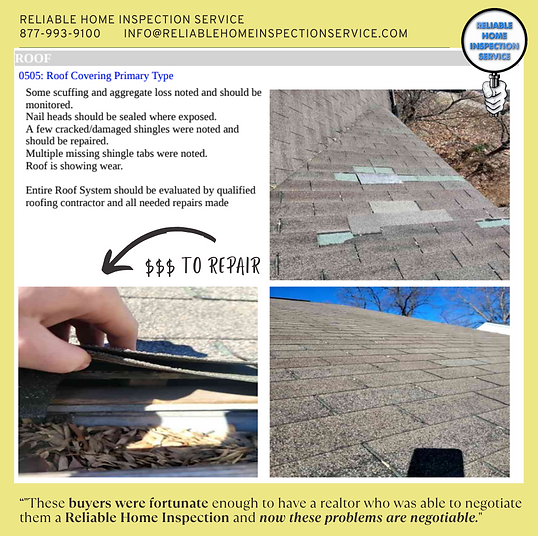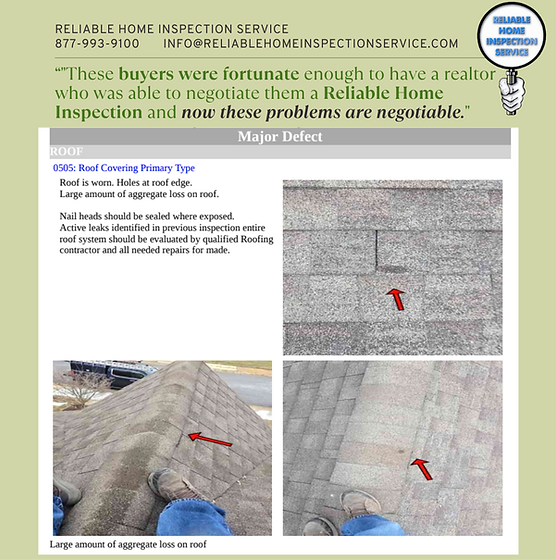

Reliable Home Inspection Service
UNAPOLOGETICALLY HONEST
HOME INSPECTIONS
Inspecting Homes Since 1993!
The Full Story
Why a Thorough Home Inspection Is Vital for Your Investment, and How Your Realtor Should Help Make It Happen
Buying a home is one of the biggest investments you'll ever make. The excitement of finding your ideal property is palpable, but the path to homeownership can be strewn with obstacles. A vital step in this journey that often gets overlooked is the home inspection. A thorough inspection can reveal serious problems that might lead to costly repairs down the line. Paired with a knowledgeable realtor who can negotiate effectively on your behalf, this process becomes far less daunting.
.png)
Perspective
When buyers consider purchasing a home, they often focus on appealing features like the layout or backyard size. But many significant concerns lurk behind the scenes. Issues such as faulty plumbing, outdated electrical systems, or hidden mold can add thousands of dollars in repair costs if overlooked.
According to the National Association of Realtors, buyers who skip home inspections can face repair bills averaging $14,000. A proper home inspection can clarify the property's overall condition. This not only helps avoid unexpected expenses but can also grant buyers leverage in negotiations. For example, if a serious defect surfaces, the buyer may ask the seller for repairs or a price reduction.
A Crucial Investment
A thorough home inspection is a critical part of the home buying process that can save you unanticipated costs and difficulties after settlement. Equally important is selecting a skilled realtor who understands the inspection process, can negotiate repairs, and advocates for your interests.
Investing time and resources into a professional home inspection protects your financial commitment and helps secure a sound investment for your future. Taking the time to do this right from the beginning can lead to peace of mind as you settle into your new home.
When investing in real estate, the prospect of purchasing your dream home can quickly turn into a financial burden if major defects are left unchecked. A thorough home inspection is not just an option; it’s essential for anyone considering a home purchase.
.png)
Major Defects Found During Home Inspections Near You
Home inspections play a crucial role in identifying major defects in your potential new home. By addressing these issues before settlement, you can negotiate with the seller and ensure a smoother transition. Understanding the condition of the property empowers you to make informed decisions and prepares you for what to expect once you take ownership. Don't overlook this vital step in the home-buying process.
These significant major defects have been discovered in real homes throughout New Castle County, Kent County, Sussex County, Delaware, Pennsylvania, and Maryland. These findings highlight the importance of thorough inspections. Being aware of potential issues in your area can help you make informed choices when purchasing a home.
Understanding the Importance of Home Inspections
What Does a Home Inspection Involve?
A comprehensive home inspection examines critical components of the property. Here are several key areas covered during an inspection:
-
Structural Components: Inspectors evaluate the foundation, walls, and roof for possible damage or deterioration. For instance, a roof replacement can cost anywhere from $5,000 to $20,000 depending on the size and materials used.
-
Systems: Plumbing, HVAC, and electrical systems undergo rigorous checks to ensure safety and functionality. A faulty furnace, for example, can lead to emergency repair costs of about $1,500.
-
Interior and Exterior: Inspectors scrutinize doors, windows, and siding for signs of damage or efficiency problems. Windows that need replacement can cost around $300 to $1,000 each.
-
Pest Inspection: Many inspectors include pest assessments to identify issues like termites that can cause severe structural damage.
-
Safety Hazards: Essential elements such as smoke detectors and carbon monoxide alarms are checked to confirm they meet safety standards.
Having a reputable inspector ensures all crucial areas are thoroughly checked, offering peace of mind to buyers.
Major Defects to Watch For:
Certain defects can greatly impact a home's value and should be on every buyer's radar:
-
Roof Damage: A damaged roof may lead to water leaks, costing homeowners an average of $11,000 for repairs.
-
Foundation Issues: Minor cracks can evolve into significant structural concerns. Foundation repair costs can range from $2,000 to $8,000, depending on the severity.
-
Water Damage: Signs of water damage may signal plumbing failures. Restoration might cost upwards of $3,000 for repairs and remediation.
-
Mold: A serious health risk, mold removal can cost between $1,000 and $30,000 depending on the extent of the problem.
Recognizing these critical areas can empower buyers to make well-informed decisions during the purchasing process.
While each home is unique, some major defects frequently arise during inspections. Understanding these can help you appreciate why the inspection process is vital.
Structural Issues
The foundation is one of the most critical aspects of any home. Problems can arise from poor drainage, soil erosion, or settling over time. Signs such as cracks in walls, uneven floors, and doors that stick may indicate significant structural issues.
Addressing these early on can help you negotiate repairs or even reconsider the purchase before it’s too late.
Electrical Systems
A reliable electrical system is fundamental, yet homeowners often underestimate its importance. Outdated wiring can pose serious risks, such as fire hazards, flickering lights, or appliances that fail to work. An inspector will check if the electrical system meets current safety standards suitable for modern living, potentially saving you from future safety issues or expensive upgrades.
Plumbing Issues
Plumbing problems are often hidden, but they can become costly. The inspector will look for signs of leaks under sinks, around toilets, and within walls. Ignoring these issues could lead to extensive water damage or mold growth. Being proactive about plumbing inspections can save you from emergency repairs later on.
Roofing Problems
The roof protects your home from the elements, making its condition crucial. A thorough inspection assesses the roof's age, condition, and any damage like missing shingles or leaks. Knowing the roof's state helps you budget for repairs or replacements—crucial for understanding long-term ownership costs.
Understanding the Importance of Home Inspections
Home inspections provide a detailed evaluation of a property's condition before finalizing the transaction. They are crucial for identifying underlying issues that could lead to costly repairs.
A thorough inspection can uncover:
-
Structural defects, such as foundation cracks.
-
Safety hazards, including outdated electrical wiring.
-
Problems with major systems, like plumbing and heating.
Knowing these issues before closing can save buyers thousands of dollars and avoid future headaches.
Falling in love with a property can sometimes cloud judgment, making it easy to overlook potential red flags. A professional home inspection is a reality check, ensuring you make an informed decision.
The Role of Your Realtor in the Home Inspection Process
Selecting the right realtor is essential, as they advocate for your interests during the inspection process. A knowledgeable realtor understands home inspections, identifies red flags, and negotiates necessary repairs or concessions for you.
Communicates Effectively
In real estate transactions, communication is key. Your realtor should clarify the results of the home inspection so you can understand what they mean for your purchase. If issues arise, they will facilitate discussions with both you and the seller to ensure everyone is aligned regarding needed repairs or changes in the purchase agreement.
A skilled realtor simplifies complex jargon and presents your options in a clear, concise manner.
Negotiates for Your Best Interests
After the inspection, your realtor should negotiate repairs or price adjustments based on the findings. They will use the inspection report to advocate effectively on your behalf, ensuring any significant repair needs are addressed before you commit to buying. For example, if major plumbing repairs are required, your realtor should fight for a reduction in the purchase price to account for these costs.
Provides Guidance on Next Steps
Following the inspection, your realtor should guide you through the decision-making process. Should you ask for repairs? Is it worth walking away from the deal? A knowledgeable realtor can help you evaluate the implications of the inspection findings and understand the property's overall value.
Having this support can lead to better decisions and ensure the process does not feel overwhelming.
The Financial Impact of Skipping an Inspection
Although it may seem tempting to skip a home inspection to expedite the buying process, especially in competitive markets, doing so can have severe financial consequences.
Unexpected Repair Costs
If major defects are undetected, the burden will ultimately fall on you as the new homeowner. For instance, untreated mold can lead to remediation costs ranging from $500 to $30,000, depending on the severity. Major structural problems can also mean extensive repairs, potentially costing tens of thousands of dollars.
What initially appeared to be your dream home can swiftly transform into a financial nightmare without proper safeguards in place.
Impact on Resale Value
Unaddressed issues found post-purchase can not only lead to repair costs but also decrease your home's resale value. Many potential buyers hesitate to invest in a property with known issues, complicating your ability to sell in the future.
A comprehensive home inspection helps secure your investment by ensuring you are aware of the property's true condition from the start.
Emotional Toll
The stress resulting from significant home issues can impact your emotional well-being. Buying a home should be an enjoyable experience, but discovering major defects after closing can cause anxiety and frustration.
A thorough home inspection is a critical part of the home buying process that can save you unanticipated costs and difficulties after settlement. Equally important is selecting a skilled realtor who understands the inspection process, can negotiate repairs, and advocates for your interests.
Investing time and resources into a professional home inspection protects your financial commitment and helps secure a sound investment for your future. Taking the time to do this right from the beginning can lead to peace of mind as you settle into your new home.
